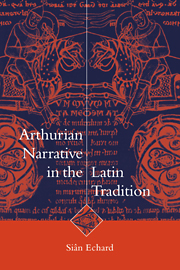Book contents
- Frontmatter
- Contents
- Acknowledgments
- Note on translations
- Introduction: Latin Arthurian narrative and the Angevin court
- 1 “The Anger of Saturn shall fall”: Geoffrey of Monmouth's Historia regum Britannie and the limits of history
- 2 “This is that Arthur”: chronicle responses to Arthur
- 3 “Are you the only uncivilized knight produced by sweet Britain?”: Arthurian episodes and knightly conduct
- 4 “Understanding the thing as it is”: De Ortu Waluuanii and the challenge of interpretation
- 5 “Dies fantastica”: the Historia Meriadoci and the adventure of the text
- 6 “When I have done you will be little the wiser”: Arthur and Gorlagon, Vita Merlini, and parody
- Conclusion: “A wise man may enjoy leisure”: The place of Latin Arthurian literature
- List of works cited
- Index
- CAMBRIDGE STUDIES IN MEDIEVAL LITERATURE
Introduction: Latin Arthurian narrative and the Angevin court
Published online by Cambridge University Press: 10 November 2010
- Frontmatter
- Contents
- Acknowledgments
- Note on translations
- Introduction: Latin Arthurian narrative and the Angevin court
- 1 “The Anger of Saturn shall fall”: Geoffrey of Monmouth's Historia regum Britannie and the limits of history
- 2 “This is that Arthur”: chronicle responses to Arthur
- 3 “Are you the only uncivilized knight produced by sweet Britain?”: Arthurian episodes and knightly conduct
- 4 “Understanding the thing as it is”: De Ortu Waluuanii and the challenge of interpretation
- 5 “Dies fantastica”: the Historia Meriadoci and the adventure of the text
- 6 “When I have done you will be little the wiser”: Arthur and Gorlagon, Vita Merlini, and parody
- Conclusion: “A wise man may enjoy leisure”: The place of Latin Arthurian literature
- List of works cited
- Index
- CAMBRIDGE STUDIES IN MEDIEVAL LITERATURE
Summary
The Queste del Saint Graal ends with an account of its own redaction: the romance has been drawn from records in the library at Salisbury by “Master Walter Map,” working “for the love of King Henry, his lord.” La Mort le Roi Artu later repeats the attribution:
After Master Walter Map had put down in writing what seemed enough to him about the Adventures of the Holy Grail, his lord King Henry was of the opinion that what he had done would not suffice, were he not to recount the end of those of whom he had made mention before, and how those whose prowess he had mentioned in his book had died. And for this reason he began this last part.
Although these attributions are not taken at face value today, they form a useful point of departure for this study of Latin Arthurian narrative. While Map did not write these vernacular romances, it is nevertheless probable that someone like him did. The attributions contain in germ all the important material for this study. The supposed author of a seminal vernacular cycle of Arthurian romance is figured to be a Latinate courtier-cleric, university educated, and a member of the circle of Henry II, the Angevin king widely praised as litteratus. Map's lord is the patron credited with the impulse for the creation (“translation”) of the work. Even though it is probably spurious, the attribution is in another sense perfect.
- Type
- Chapter
- Information
- Arthurian Narrative in the Latin Tradition , pp. 1 - 30Publisher: Cambridge University PressPrint publication year: 1998



